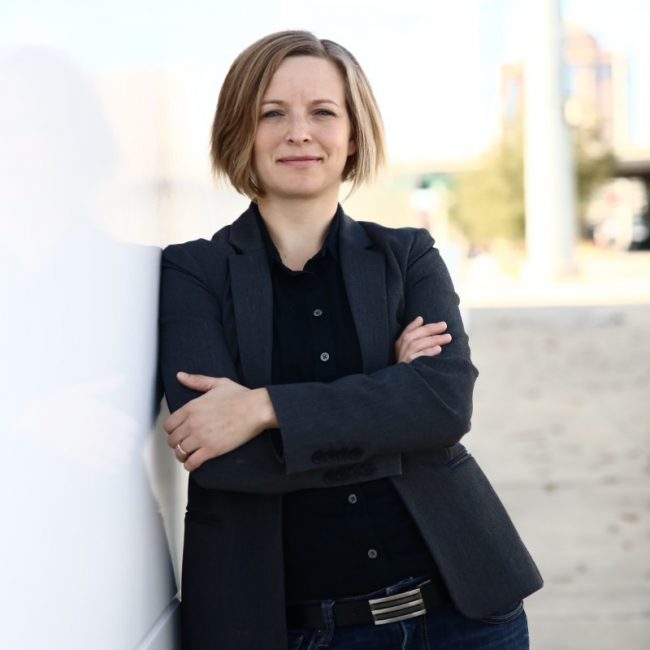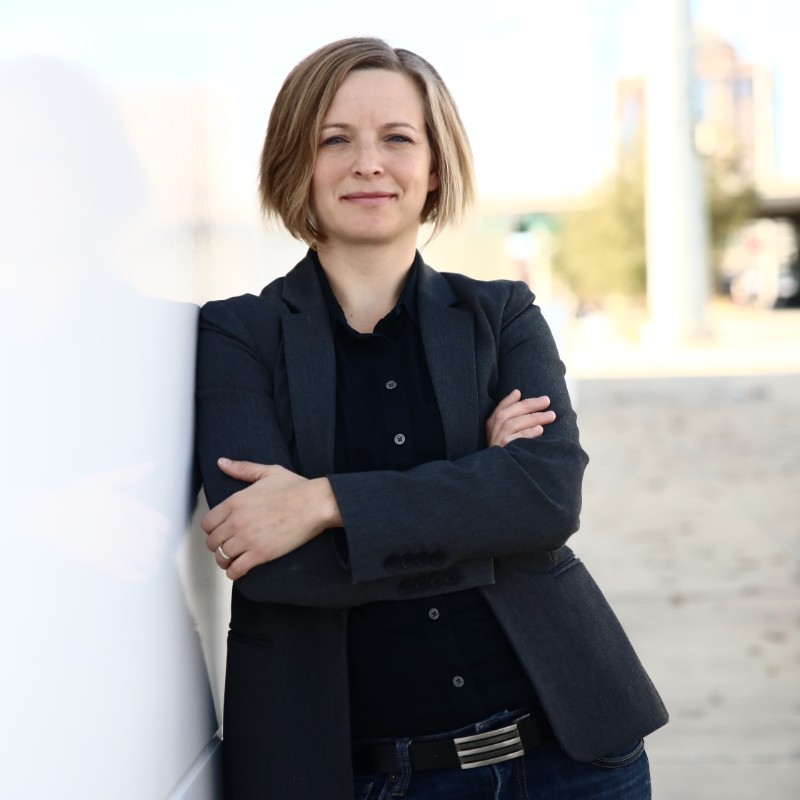Curated conversations with data and AI for social impact leaders on their career journeys
Pathways to Impact is a series of conversations with data for social impact leaders exploring their career journeys. Perry Hewitt, CMO of data.org, spoke with Danielle Getsinger, co-founder and CEO of Community Lattice, about different pathways to break into the data for social impact sector.
How did you find your way to a career in data science for social impact? Did you come in from the data/tech or the social impact side? And how did you find a home here?
Actually, I fell into Data Science for Social Impact. I’m a geologist — I trained as an undergraduate as a geologist and then started working in environmental consulting. Most people that I know who go into geology go into it because they’re conservationists at heart. They want to save the planet Earth, and are very passionate about earth science and about the interaction with the Earth and its people.
In environmental consulting, I found that a lot of people flock towards environmental consulting or environmental research as a way to impact the social aspects and our lived experience with nature. We study the earth to understand our natural resources and threats of environmental hazards or earth hazards on populations, like earthquakes and volcanoes. That is how we geologist nerds become relevant and useful in saving our planet.
But my entry point with applying data to those problems was really knowing my business partner Shannon [Loomis]. Her perspective on the world is really rooted in research and data science, and she was applying these skills to climate research. When we combined our brains and our knowledge of what was needed to advance social issues through the lens of environmental impact, that’s where the light bulb went off that we needed to do this from a data science angle.
What specific set of problems are you seeking to solve using data science?
I’ve always been passionate about conservation and the environment. Although I started out as a country girl growing up in northern New Hampshire, I love cities. There’s excitement with just being in a city, with so much energy and history. But there’s also a lot of environmental degradation that happens with cities. I see the world in terms of its contamination. There’s just so much waste, so much toxic contamination flushing through our cities and exposure of those toxins to people.
That’s the problem, and there are a lot of ways that we can tackle it. One of those ways is to focus on brownfields redevelopment. I started my career in Pittsburgh, which faced challenges all over the city from the steel industry. Pittsburgh put a real focus on brownfields redevelopment: cleaning up properties whose development was complicated by the presence of contaminants.
Like many cities, Pittsburgh has so much rich history: American history, cultural history throughout the fabric of those old buildings and of the factories. Brownfields redevelopment was part of their big push for repurposing old factory and mill buildings for farmers markets, artists’ lofts, [and] affordable housing. At Community Lattice, we use data to facilitate redevelopment, which can shape the culture of a city and promote financial inclusion. And through this process, we are encouraging the assessment and cleanup of the contamination left behind by industry.
What were unexpected blockers to your career entry or to career progression?
I realized fairly early on that traditional environmental consulting was not the path for me. At the time, I tried to change the consulting world in order to make it my own. But the roadblock was that nobody within environmental consulting really understood what I wanted to do.
I remember the first time—it was actually on the LA River project—that I said, “We need to take the environmental data, overlap it with this project, and then try to make this a more efficient system for evaluating what the potential effects of contamination could be.” The response was, “Oh, no, that’s going to take too much time. We just don’t have time for that.” They just couldn’t see their way to understanding that data would make the progress faster. One of the roadblocks to this understanding was that we actually didn’t have the staff that was skilled enough to be able to do that. It was a capacity and even a data literacy question. People who are decision-makers, professionals in this field still don’t understand what data can do. So that was a roadblock.
And then in the field of urban planning, I still get roadblocks questioning, “Why do we need a geologist here?” Geologists in this field are not really common. We overcame this roadblock by demonstrating the value of the environmental data, and how data driving efficiency actually worked. Really, with the data.org Challenge funding, we were able to better show: This is what we mean. This is what you can do. And this is why data needs to be part of your urban planning process.
We’re actually now using the tech created with this funding that we’ve just renamed PEER, which is a platform for exploring environmental records. We integrated our PEER platform into a data-heavy regional and city planning effort for creating neighborhood resiliency plans. With this platform, when urban planners are looking at vulnerability within the neighborhood, they’re now coming up with our data set. Before they weren’t collecting all of the environmental records, which is insane to me.
You don’t need to be a data expert to find a pathway in; it’s really working in service of society.
Danielle Getsinger Chief Executive Officer Community Lattice
The EPA is advancing in that regard as well, being able to push more of their data into that urban regional planning space. So I think that the biggest roadblock here has been people historically did not understand why a geologist would be in this field. The data angle has broken down that barrier—it’s kind of my Trojan horse—it allows the geologists to get in. Even if we still have work to do in data literacy, there’s a common language in data.
What non-data science skillset has offered the greatest return in your work?
What I’m really quite good is making connections and finding vital common threads, whether it’s connecting community members with a government agency, or one city department with another. I identify the common thread and say, “You guys need to talk.” I’ve really focused in on that strength.
But overall? Communications is the thing that has been the secret to my success. Being able to get across the points that need to resonate with whatever audience we need to reach. Whether that’s a grant application, whether that’s a speaking engagement, communication, at the end of the day, communications has really been my superpower.
For that, I have to thank my aunt who is an English major. Throughout high school and college, she would rip apart all my papers. Because of that emphasis, I can write a grant application. I can write just about anything and convince people to support and advance this work.
What advice do you have for someone new to the field but interested in doing this work?
Here’s what I frequently tell students who ask me that question: Instead of finding the opportunity for a job or a career, find the societal need that matters most to you, and figure out how to make a living addressing that need. That need will always be there; find it, and apply your passion in supporting that need. The rest will fall in line if you’re focused on how you’re using your skills to serve that need. You don’t need to be a data expert to find a pathway in; it’s really working in service of society.
Part of the Pathways to Impact series
What’s the next ‘big thing’ in data that you see?
Honestly, it might be a tech breakthrough, but I’m not allowed anywhere near the tech. Instead, I’ll point to one thing: the big breakthrough would be a broad shared understanding of the opportunity to use data science and to use technology in a much smarter way than we’re doing. We need this at a professional level, across the board.
For example, we still struggle at the city level to convince certain clients that they need to have an open source data portal or that they need to have data tools available for their residents. It’s hard to convey the value when they don’t understand it or see the potential.
To tackle this problem, we’re also working on the industry end with American Society for Testing Materials (ASTM). ASTM develops standards, and in the environmental field, they develop standards for environmental due diligence, and the industry practice follows these standards. We’re working with them right now to incorporate data literacy into their community mapping and the updating of their standards. If through mechanisms like these, we can really influence how people are using, understanding, and communicating data, that’s where we’re going to have some serious breakthroughs.
What’s your “don’t miss” daily or weekly read? Data science topic or addictive apps welcome.
Too many to mention them all! I am a big reader of the Houston Chronicle, which offers a clear picture of what is going on locally here. I am tracking that constantly. From a bigger national level or tech level, I’m honestly stalking everybody on Twitter. I’m not super active, but I am definitely following the feeds focused on data and the environment. And Michael Regan, I am stalking you (in a friendly way, of course)!
About the Author
Chief Strategy Officer Perry Hewitt joined data.org in 2020 with deep experience in both the for-profit and nonprofit sectors. She oversees the global data.org brand and how it connects to partners and funders around the world.
Read moreSeries
Pathways to Impact
This data.org series interviews leaders in Data Science for Social Impact with a lens of how they got there, as well as the skills and experiences that have fueled their career progression.
data.org In Your Inbox
Do you like this post?
Sign up for our newsletter and we’ll send you more content like this every month.
By submitting your information and clicking “Submit”, you agree to the data.org Privacy Policy and Terms and Conditions, and to receive email communications from data.org.


